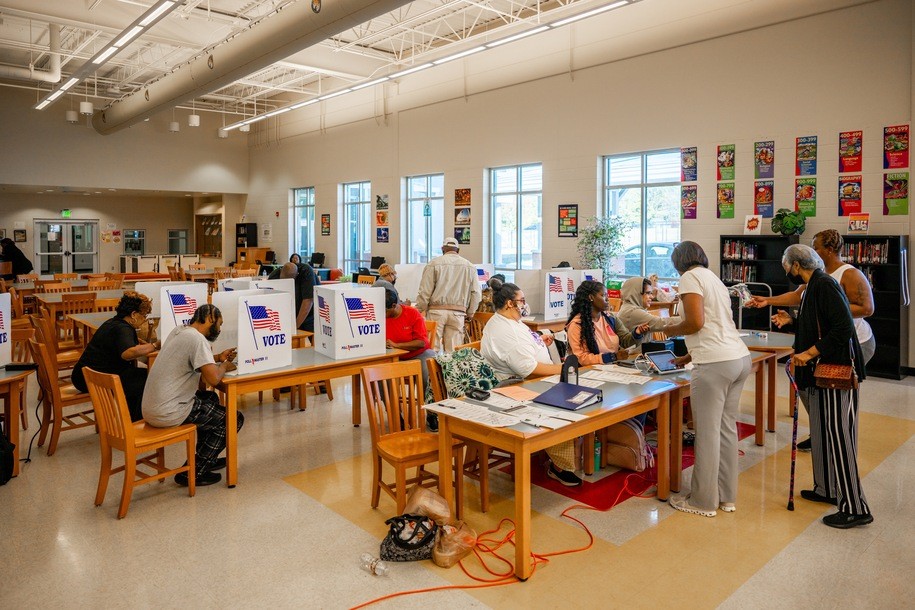
The Morning Digest is compiled by David Nir, Jeff Singer, and Stephen Wolf, with additional contributions from the Daily Kos Elections team.
Subscribe to The Downballot, our weekly podcast
Daily Kos Elections will be taking a break for the 4th of July holiday. The Morning Digest will be back on Tuesday. Have a happy and safe holiday!
Leading Off
● MS Redistricting: A panel of three federal judges blocked Mississippi’s legislative gerrymanders on Tuesday, determining that Republicans violated the Voting Rights Act by discriminating against Black voters. The decision is the latest in a string of rulings in several states where courts have overturned Republican gerrymanders for discriminating against voters of color after the 2020 census.
Tuesday’s ruling ordered lawmakers to draw two new state Senate districts and one new state House district where Black voters could elect their preferred candidates, who would almost certainly be Black Democrats in what is one of the nation’s most racially polarized states. Several surrounding districts may also have to be redrawn to implement those changes.
Mississippi used its new maps for the first time last fall to elect lawmakers to four-year terms, resulting in Republicans winning a veto-proof two-thirds supermajority in the Senate and just shy of one in the House. While the court ruled that special elections must be held for any redrawn districts and expressed its desire to “have new legislators elected before the 2025 legislative session convenes” on Jan. 7, that outcome’s likelihood is remote if Republicans appeal, as appears likely.
In recent years, the U.S. Supreme Court’s far-right majority has repeatedly paused similar rulings on the dubious grounds that several months or less is too little time before an election to implement a new map, rulings that have almost always favored Republicans. However, if Tuesday’s decision survives an appeal, new elections will eventually take place using redrawn maps, though it’s unclear exactly when.
Mississippi joins a list of states where courts found Republicans discriminated against voters of color in recent years. Alabama, Georgia, and Louisiana are using new maps this fall after courts overturned their 2022 maps for violating Black voters’ rights, while North Dakota is using new legislative maps after a court determined Republicans had discriminated against Native American voters.
Lower courts also overturned maps in South Carolina and Florida for harming Black voters, but the Supreme Court reversed the South Carolina ruling in a June decision that will make it much harder for voters to challenge certain racial gerrymanders. In Florida, far-right appellate judges have dragged out the appeals process and ensured that no new congressional map will be used until at least after the 2024 elections. Litigation is ongoing in North Carolina, Texas, and other states, including over Georgia’s newest maps.
2Q Fundraising
House
● MO-01: Rep. Cori Bush on Wednesday publicized an endorsement from St. Louis Mayor Tishaura Jones, whose city is home to about 40% of the 1st District’s denizens, ahead of the Aug. 6 Democratic primary. St. Louis Public Radio’s Jason Rosenbaum says that Jones has been an ally of both Bush and her main intra-party rival, St. Louis County Prosecuting Attorney Wesley Bell.
Ballot Measures
● AZ Ballot: Arizona for Abortion Access announced Wednesday it had submitted about 824,000 signatures, which it said was a state record, ahead of that day’s deadline to place their abortion rights amendment on the November ballot. County election officials have until Aug. 22 to verify that the group has turned in about 384,000 valid signatures.
The amendment would safeguard abortion rights until fetal viability, which is about 22 to 24 weeks into a pregnancy. The current law, which Republicans passed in 2022, bans the procedure after 15 weeks with no exceptions for rape or incest. Arizona for Abortion Access has argued that the status quo is unacceptable and “denies us the right to make decisions about our own health.”
● CA Ballot: Gov. Gavin Newsom and California’s Democratic-run legislature announced Tuesday evening that they’d abandoned their effort to place a measure on the November ballot that would have been an alternative to what they’ve called a “draconian” proposal to increase penalties for many non-violent crimes.
Supporters of that proposal, which they’ve dubbed the “California Drug and Theft Crime Penalties and Treatment-Mandated Felonies Initiative,” collected the requisite number of signatures in the spring. The plan would roll back parts of Proposition 47, a decade-old measure that the California District Attorneys Association and big-box retailers have been attacking.
This latest plan, which has not yet been assigned a number, would increase the punishment for several crimes related to drug possession and theft whose penalties had been reduced by Proposition 47. The San Francisco Chronicle reported last month that the “yes” side had raised $8.5 million, with Walmart, Target, and Home Depot serving as its largest donors.
Democratic lawmakers hoped they could convince the plan’s proponents to remove it from the ballot ahead of last week’s deadline by introducing several bills aimed at combating retail theft, but they failed to reach an agreement.
Newsom and legislative leaders said they would instead place a rival measure on the ballot to “put public safety first without reverting to outdated and ineffective policies of decades past” and had until Wednesday to secure the necessary support in both chambers. On Tuesday evening, though, the governor said that Democrats’ alternate measure wouldn’t move forward.
“We are unable to meet the ballot deadline to secure necessary amendments to ensure this measure’s success and we will be withdrawing it from consideration,” Newsom said. “I look forward to working with the Legislature and our public safety and retail partners to go even further in the days ahead, without returning to the damaging policies of decades past.”
Ad Roundup
Campaign Action